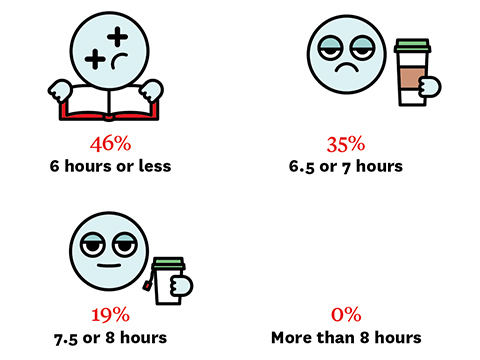When school and work start piling up, students sacrifice sleep to get everything done. But skipping slumber can have adverse effects. In a 2010 study, for example, U of T psychologists found that memory retention in young adults correlated with the amount of sleep they got.
Her usual five hours of sleep “could be better” confesses Hyuna Yun, a first-year student in cognitive science at University College. She’s not alone among our surveyed students, but researchers say teens need, on average, nine to 10 hours a night, adults seven to eight. Those who sleep less than their body requires risk sleep disorders, stress and depression.
Students who enjoyed the most shut-eye say time management is the secret. “I just figure out what could be put off,” says third-year physics and astronomy student Ariel Amaral. “Then it’s possible to delegate for another day and get a few extra hours of sleep.”
This highly unscientific poll of 100 students was conducted on the St. George campus in November, during mid-terms.
Recent Posts
People Worry That AI Will Replace Workers. But It Could Make Some More Productive
These scholars say artificial intelligence could help reduce income inequality
A Sentinel for Global Health
AI is promising a better – and faster – way to monitor the world for emerging medical threats
The Age of Deception
AI is generating a disinformation arms race. The window to stop it may be closing




